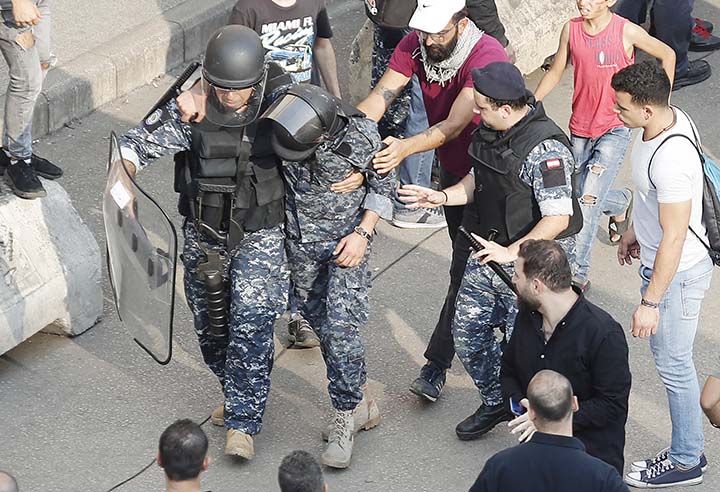
AP, Beirut :
The leader of Lebanon’s Hezbollah group said Friday that nationwide protests against the country’s political class have been exploited by foreign powers and were no longer spontaneous, warning they could drag the country toward civil war.
Hassan Nasrallah’s comments came shortly after his supporters clashed with anti-government protesters in central Beirut. His supporters rejected the protesters equating the powerful group’s leader with other corrupt politicians they want to see step down. A popular refrain in the rallies, now in their ninth day, has been: “All means all.”
The unprecedented nationwide protests that began Oct. 17 were triggered by proposed new taxes, including on the use of the WhatsApp mobile application. They came on the heels of an austerity budget that cut public spending, pensions and employee benefits to tackle a deepening economic crisis.
Protesters took to the streets in the capital Beirut and in cities in the north and south in some of the largest protests in nearly 15 years. The rallies have brought together Lebanese from all groups and sects against politicians who have been in power since the country’s civil war ended in 1990, some even before.
On Friday, Nasrallah said the protests are no longer popular or spontaneous. He said the rallies have been exploited by political rivals as well as regional and international powers that oppose Hezbollah. He did not elaborate on the allegations of foreign interference but said his group has information of such collusion.
“It is no longer a popular movement, protests about health and the environment and hunger and recession,” he said in an hour-long televised speech.
Last week, Nasrallah praised the protesters for pressuring the Cabinet into making major reform decisions but he said he rejected their calls for the government to step down.
Iran-backed Hezbollah is facing widening U.S. sanctions amid tension between Washington and Tehran.
The militant group dominates the current government and is the country’s most powerful organization, building its credibility on its resistance to Israel’s occupation of parts of Lebanon.
Nasrallah evoked the specter of new civil war like the one that ended in 1990.
“We are not worried about the resistance,” he said. “We are worried for the country that someone is trying to pull it … toward a civil war.”
Nasrallah called on supporters to leave the protests to avoid friction. Just before he spoke, scuffles had broken out in the epicenter of the protests in central Beirut, when Hezbollah supporters entered the area and chanted in support of Nasrallah.
“Nasrallah is more honorable than all of them,” the pro-Hezbollah protesters, dressed in black shirts, chanted. Riot police tried to break up the fight, encircling the Hezbollah supporters who had used batons to push back against the anti-government protesters.
As soon as Nasrallah finished his speech, dozens of Hezbollah supporters left the square while chanting in support of the group. Another brief scuffle broke out and the riot police again interfered. Meanwhile, hundreds of Hezbollah protesters rallied in the group’s stronghold in south Beirut, raising the group’s yellow flag on their motorcycles.
The army and special forces deployed along the road outside Hezbollah’s stronghold, known as Dahiyeh, apparently to prevent renewed friction. Members of Hezbollah also deployed on entrance and exits to Dahiyeh, in a clear move to block supporters from heading to central Beirut.
Nasrallah said it is time for the protesters to find representatives to negotiate with the government over their original demands for better living conditions and accountability for senior officials. He called on protesters to stop blocking roads as part of their civil disobedience campaign.
Despite government promises of reforms, the protesters have dug in, saying the country’s incumbent officials are corrupt and must go. They have set up tents, blocking traffic in main thoroughfares and sleeping in public squares on Friday to enforce a civil disobedience campaign and keep pressure on the government to step down.
“We will accept nothing less than the resignation of the government, the president, dissolving the parliament and holding early parliamentarian elections,” said Mohammad Mazloum, an engineer who has been protesting since the protests began.

